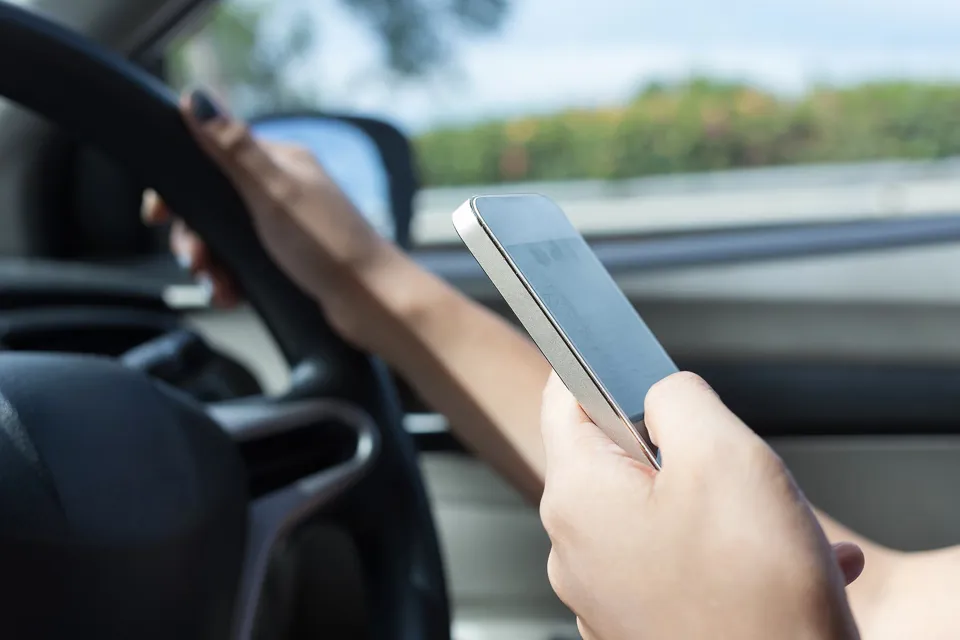The Government wants to close a loophole in the law around the use of hand-held mobile phones behind the wheel.
Roads Minister Baroness Vere unveiled plans over the weekend that would mean people using a hand-held mobile phone in all circumstances while driving would be breaking the law.
It is already a criminal offence to use a hand-held mobile phone to call or text while driving, but not for other actions such as taking photos.
The law says that an offence is committed if a driver uses a handheld mobile phone for “interactive telecommunication” while behind the wheel.
The phrase reflects how, when the law was written in 2003, smartphones were not in existence and mobile devices were used for sending texts or making calls.
It has enabled lawyers to successfully argue that using a phone’s camera while driving does not constitute “interactive telecommunication”.
It was brought to a head last year, after the Director of Public Prosecutions had lodged an appeal with the High Court after Ramsey Barreto had a conviction quashed for filming a crash on his mobile phone.
The 51-year-old was prosecuted and found guilty after police saw him driving past an accident using his phone to make a video. However, he had the conviction overturned at Isleworth Crown Court, after his lawyers successfully argued that the law only banned the use of mobile phones to speak or communicate while behind the wheel.
Publishing its decision in July 2019, the High Court dismissed the appeal, agreeing with Barreto’s lawyers.
Now, following a review of the offence announced in the wake of the appeal, a consultation has been launched on bringing the law into line with modern technology – meaning drivers caught taking photos, playing games or scrolling through a playlist behind the wheel will be clearly breaking the law on mobile phone use.
However, recognising that mobile phones are commonly used as a method of payment – such as at drive-thrus – an exemption will apply to contactless payments, if a vehicle is stationary, and if goods or services – such as a takeaway meal – are delivered immediately.
Roads minister Baroness Vere said: “We’re looking to strengthen the law to make using a hand-held phone while driving illegal in a wider range of circumstances – it’s distracting and dangerous and for too long risky drivers have been able to escape punishment but this update will mean those doing the wrong thing will face the full force of the law.
“Ministers have rejected calls to go further by banning the use of hands-free functions – drivers will still be able to continue safely using devices ‘hands-free’ while driving, such as a sat-nav secured in a cradle.”
The proposals come as new research published by the Government gives a further snapshot into driver behaviour in the UK.
The project, commissioned by the Department for Transport (DfT) and carried out by the University of Leeds, looked at footage of 51 drivers and found over 765 trips, 662 mobile phone interactions were observed with only 38 completely hands-free.
At 30mph, a car travels 100 feet in 2.3 seconds – meaning even a split-second lapse from changing a song on a playlist or checking an app could result in a crash.
By updating the law, police powers will be bolstered to tackle this behaviour even further – ensuring they can take immediate action if they see a driver holding and using their phone at the wheel, says the DfT.
The penalties in place for using a hand-held mobile phone while driving are six penalty points and a £200 fine.
National Police Chiefs’ Council lead for roads policing, Chief Constable Anthony Bangham, said: “Using a mobile phone while driving is incredibly dangerous and being distracted at the wheel can change lives forever.
“Police will take robust action against those using a hand-held mobile phone illegally and proposals to make the law clearer are welcome.”
The Government is also conducting a review of road traffic policing and wider traffic enforcement – to look at how roads policing currently works, its effectiveness, and where improvements could be made.
Road safety charity, Brake has welcomed the Government’s move to consult on and improve the offence of driving while using a hand-held mobile device, and close potential loopholes, but still wants to see the dangers of hands-free devices addressed.
The safety campaigners are highlighting last year’s Transport Select Committee report on mobile phone use when driving, which found that: “The evidence shows that using a hands-free device creates the same risks of a collision as using a hand-held device, and it is therefore inappropriate for the law to condone it by omission.”
The Government response to the Select Committee report did not dispute the evidence, stating “The Government acknowledges the risks associated with the use of hands-free mobile phones while driving” but went on to note that, “However, despite those risks, there are many difficulties associated with a potential ban on hands-free use.”
Director of campaigns for Brake, Joshua Harris, said: “When amending the law on phone use when driving, the Government must also take the opportunity to prohibit the use of hands-free devices.
“The current law gives the impression that it is safe to use a mobile phone with a hands-free kit when the evidence is clear that it is not.
“Banning hands-free devices may be challenging but we urge the Government to prioritise the lives of road users and take action now.”






















Login to comment
Comments
No comments have been made yet.